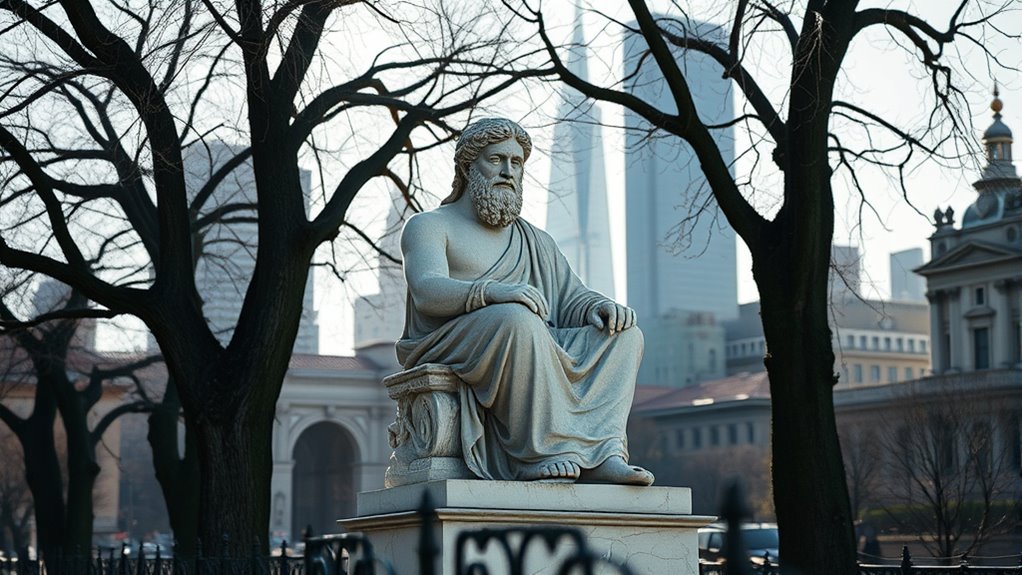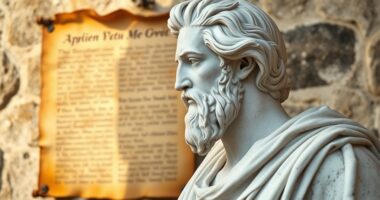Stoicism shapes culture and leadership by emphasizing resilience, self-control, and ethical decisions that influence how leaders handle adversity and inspire others. Throughout history, figures like Theodore Roosevelt and George Washington drew from Stoic virtues, setting examples for modern politicians, entrepreneurs, and athletes who incorporate these principles to stay calm under pressure and foster personal growth. Its influence appears in media, pop culture, and personal development, opening a pathway to explore how these timeless ideas continue to evolve and impact today’s society.
Key Takeaways
- Stoic virtues like wisdom, courage, and resilience influence modern leadership styles and societal values.
- Historical leaders exemplified Stoic principles to guide decision-making and inspire perseverance.
- Media and pop culture normalize Stoic traits through portrayals of resilience and emotional regulation.
- Contemporary leaders adopt Stoic practices for emotional control, ethical decision-making, and public trust.
- Stoicism promotes mental toughness, self-awareness, and adaptability in various fields, shaping cultural and leadership paradigms.
Historical Leaders and Their Stoic Inspirations

Many of history’s most influential leaders drew inspiration from Stoic philosophy to guide their actions and decisions. They embraced ancient virtues like wisdom, courage, and temperance, which shaped their moral compass. These leaders developed philosophical resilience, staying steadfast amid adversity. Theodore Roosevelt carried Epictetus and Marcus Aurelius on his expedition, drawing strength from their teachings. George Washington found inspiration in Stoic ideals of self-control and duty. Such figures demonstrated that enduring virtues and resilience could elevate leadership, helping them navigate challenges with clarity and purpose. Their reliance on Stoic principles underscores the timeless power of ancient virtues in shaping effective, resilient leaders. Additionally, the values promoted by Stoicism, such as self-discipline and emotional regulation, continue to influence modern leadership philosophies. Moreover, recent developments in AI security highlight the importance of applying disciplined, resilient approaches to emerging technological challenges, reinforcing the enduring relevance of Stoic virtues.
Modern Politicians and Their Enduring Connection to Stoicism

Modern politicians continue to draw inspiration from Stoic philosophy as they navigate the complexities of leadership and public service. They incorporate Stoic principles into modern political strategy, emphasizing resilience, clarity, and ethical decision making. Leaders like Tim Ferriss and Jack Dorsey advocate for Stoic practices to maintain composure and focus under pressure. By embracing Stoicism, they foster integrity and accountability, essential for effective governance. This enduring connection helps politicians stay grounded amid crises, guiding their actions with reason and virtue. Understanding ethical hacking concepts such as vulnerability mitigation and responsible use of knowledge can also inform their approach to transparency and security in governance. Additionally, applying Stoic resilience techniques can help leaders manage public scrutiny and setbacks with equanimity. Ultimately, Stoicism remains a crucial resource for shaping modern leadership that prioritizes ethical conduct and resilient decision-making.
Athletes Embracing Stoic Principles for Resilience and Success

Athletes often face intense pressure and setbacks that test their mental resilience. By embracing Stoic principles, you can develop lasting strength through ancient athletic training and sports psychology techniques. Stoicism teaches you to control your reactions, focus on what you can change, and accept what you cannot. Many top performers incorporate these ideas to stay calm under pressure, recover quickly from failures, and maintain focus. This mindset helps you build resilience, improve performance, and succeed despite obstacles. Applying Stoic lessons in your training and competitions transforms challenges into opportunities, making mental toughness an essential part of athletic excellence. Additionally, understanding cultural and regional breakfast traditions can provide insight into the diverse ways athletes prepare for their day, fueling their bodies and minds for peak performance. Recognizing how different training routines incorporate mental discipline can further enhance an athlete’s ability to stay resilient, especially when faced with unexpected setbacks. Incorporating practices like mindfulness and breathing exercises can also support mental clarity and emotional regulation during high-stress moments, which is crucial for adaptive coping strategies.
The Role of Stoicism in Music and Popular Culture

Stoicism’s influence extends beyond philosophy and into the domain of music and popular culture, where its themes resonate deeply with audiences. You can see its music influence in artists like Lupe Fiasco and Twista, who reference Marcus Aurelius and Stoic ideas in lyrics, showing how these principles inspire resilience and self-control. Pop culture also embraces Stoicism through portrayals like Marcus Aurelius in *Gladiator* or Netflix’s *Reign of Blood*. These references help normalize Stoic values, making them accessible and relevant. As you engage with modern music and entertainment, you’ll notice how Stoic themes foster strength, acceptance, and clarity, shaping cultural conversations. Additionally, understanding IRA tax laws can be crucial for retirees seeking to manage their finances wisely amid evolving regulations. Recognizing how Stoic philosophy influences contemporary storytelling and character development further illustrates its lasting cultural impact. For instance, the emphasis on emotional resilience in Stoicism encourages individuals to face challenges with equanimity, a trait often reflected in popular media. Moreover, the integration of cultural values influenced by Stoicism promotes a sense of community and personal responsibility in modern society. These cultural influences demonstrate how ancient principles continue to inspire contemporary societal norms and individual behavior.
Literary and Philosophical Figures Influenced by Stoic Thought

Throughout history, numerous influential figures in literature and philosophy have drawn inspiration from Stoic principles, shaping their ideas and writings in profound ways. Ancient texts like Marcus Aurelius’s *Meditations* and Seneca’s essays remain foundational, guiding modern thought. These figures often studied various philosophical schools, integrating Stoic ideas into their work. Philosophers such as Ralph Waldo Emerson and writers like John Steinbeck acknowledged Stoicism’s impact on their perspectives. Their engagement with Stoic texts and concepts helped develop a resilient mindset, emphasizing virtue and self-control. This enduring influence shows how Stoic thought continues to shape literature, philosophy, and the way we understand human resilience.
Tech Innovators and Entrepreneurs Advocating for Stoic Practices

Have you noticed how many tech entrepreneurs turn to Stoic practices to navigate the fast-paced and unpredictable world of innovation? They embrace a digital mindset rooted in resilience, helping them manage setbacks and uncertainty. These leaders apply Stoic principles to stay focused, develop emotional strength, and adapt quickly.
- Cultivating self-control amidst rapid change
- Using reflection to refine decision-making
- Building entrepreneurial resilience through acceptance of challenges
Resources and Tools Promoting Stoic Mindsets in Leadership

Leaders seeking to cultivate a resilient and focused mindset turn to a variety of resources and tools rooted in Stoic philosophy. Mindset coaching programs incorporate Stoic principles, helping you develop emotional regulation and clarity. Resilience training often includes exercises like negative visualization and journaling inspired by Marcus Aurelius, Epictetus, and Seneca. Books such as *The Obstacle Is the Way* and *Ego is the Enemy* serve as practical guides. Additionally, platforms like The Daily Stoic provide daily reflections, exercises, and podcasts to reinforce Stoic practices. These tools support your growth, enabling you to handle setbacks with calm, rationality and foster enduring leadership resilience. Recognizing the importance of mental clarity and emotional regulation in fostering effective leadership, many practitioners also incorporate mindfulness and stress management techniques aligned with Stoic teachings. Developing a growth mindset can further enhance your ability to adapt and thrive amid challenges, and understanding high-pressure decision-making is crucial for effective leadership. Moreover, cultivating creative resilience can help leaders navigate complex situations by fostering innovative problem-solving skills inspired by the adaptive aspects of creative practice. Engaging in reflection and self-assessment further solidifies these practices, allowing leaders to internalize lessons and continuously improve their resilience strategies.
The Impact of Stoicism on Contemporary Cultural Narratives

Stoicism has profoundly shaped the narratives that define modern culture, emphasizing resilience, self-control, and clarity in adversity. You see its influence in popular stories of overcoming challenges and personal growth, where Stoic resilience inspires perseverance. Cultural integration is evident as Stoic principles appear in media, leadership discourse, and everyday life. Additionally, the adoption of public discussions surrounding mental health and preventative care reflects the broader societal embrace of Stoic ideals. This evolving narrative promotes a mindset that values inner strength and emotional regulation, shaping how society approaches adversity today. Recognizing the importance of exfoliation and skincare routines, many individuals adopt Stoic-inspired discipline to maintain their well-being and resilience, much like the careful storage and freshness management of essential resources such as butter to ensure lasting quality. The emphasis on goal setting and self-reflection in personal development aligns with Stoic practices of self-awareness and continuous improvement, reinforcing a culture that values inner mastery. Furthermore, the integration of emotional regulation techniques into daily routines exemplifies how Stoic strategies are applied to modern mental health practices, fostering a resilient and composed society.
Frequently Asked Questions
How Does Stoicism Influence Modern Corporate Leadership Strategies?
In modern corporate leadership, you’re influenced by stoicism through emotional regulation and ethical decision-making. You learn to stay calm under pressure, making clear, rational choices even in tough situations. Stoic principles guide you to act ethically, prioritize the long-term good, and lead with integrity. This mindset helps you manage teams effectively, build trust, and navigate challenges confidently, fostering a resilient and principled workplace culture.
Can Stoic Principles Be Adapted for Everyday Decision-Making?
Did you know that many top athletes and entrepreneurs use Stoic principles to improve daily choices? You can adapt Stoic ideas for practical applications in your everyday decision-making by focusing on what you can control and practicing mindfulness. This helps you stay calm, make rational choices, and handle setbacks with resilience. Incorporate Stoic techniques like journaling or reflection to strengthen your mindset and navigate life’s challenges more effectively each day.
What Are Common Misconceptions About Stoicism in Popular Culture?
When you explore popular culture, you might think Stoicism is just about suppressing emotions or being emotionless. That’s a common myth, and it’s part of modern misinterpretations. Myth busting reveals that Stoicism actually encourages understanding and managing feelings, not denying them. People often misunderstand it as rigid or cold, but true Stoicism promotes resilience, wisdom, and inner peace — qualities that help you navigate life’s challenges with clarity and calm.
How Does Stoicism Compare to Other Philosophical Approaches in Leadership?
Think of leadership as a ship steering through stormy seas; your compass matters. Compared to other philosophies, stoicism emphasizes virtue ethics and emotional regulation, guiding you to remain steady amid chaos. It encourages you to focus on what you can control, fostering resilience and integrity. Unlike some approaches that chase success at any cost, stoicism keeps you anchored in virtue, making your leadership both effective and morally sound.
What Role Does Stoicism Play in Mental Health and Emotional Resilience?
You find that Stoicism plays a crucial role in mental health by enhancing emotional regulation and building mental toughness. It teaches you to accept what you can’t control, reducing stress and anxiety. Practicing Stoic principles helps you stay calm during challenges, fostering resilience. This mindset allows you to face setbacks with clarity and strength, ultimately improving your overall emotional well-being and empowering you to navigate life’s difficulties more effectively.
Conclusion
Just as a sturdy oak withstands fierce storms, embracing Stoicism arms you with resilience and clarity amid life’s chaos. By weaving its principles into your daily life, you become a steady force in an ever-changing world. Remember, leadership and culture are shaped by those who stay rooted, calm, and virtuous. So, nurture your inner strength through Stoicism, and watch how it transforms you into a resilient pillar everyone can rely on.









